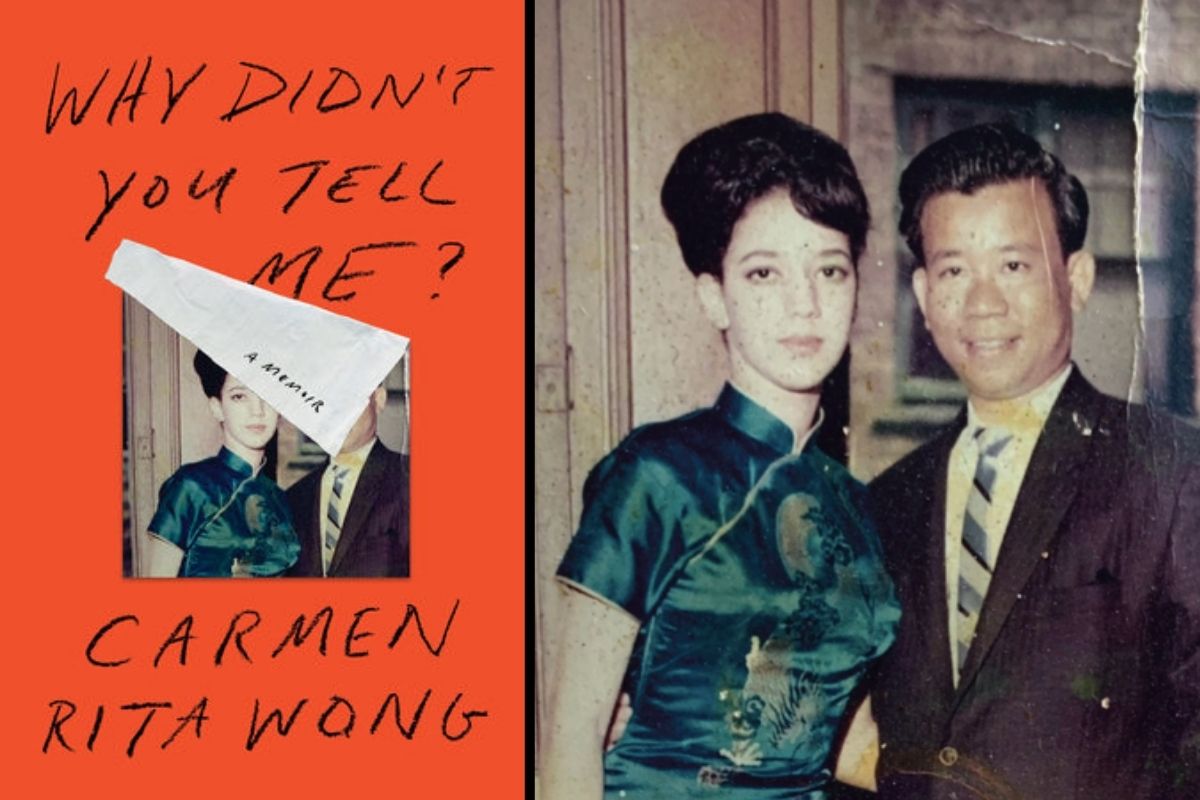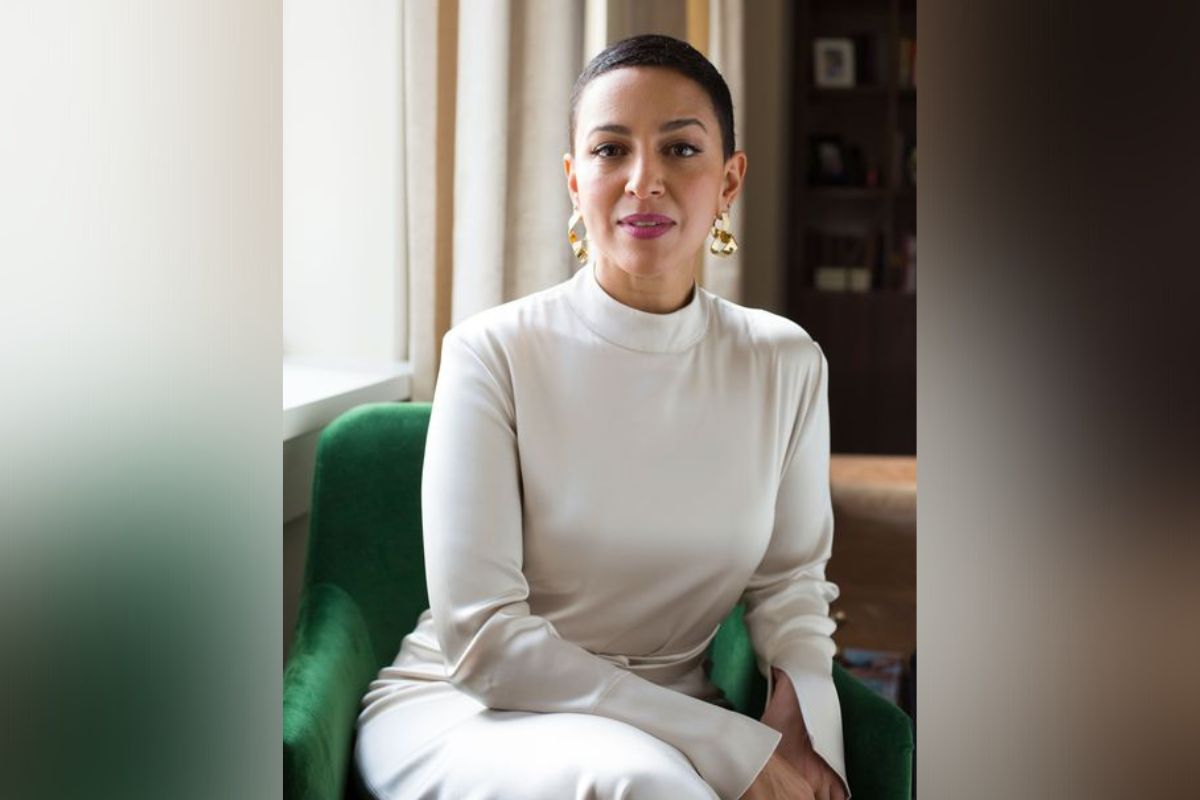A furtive family drama haunted Carmen Rita Wong (M.A. ’00, Psychology) in the ascent to prominence throughout her 20-year career in media and the nonprofit world.
“My mother carried a powerful secret,” writes Wong. “A secret that shaped my life and the lives of everyone around me in ways she could not have imagined.”
The secret forms the arc of Why Didn't You Tell Me? (Penguin Random House), Wong’s new memoir that lays bare the undisclosed origin story that upended her life after she was led to believe that she was born to a Dominican mother and Chinese father.
“Imagine living your whole life believing a certain story about yourself – where you came from, who your family is – only to see that story upended because you discover your mother has been lying to you your entire life,” NPR's Ailsa Chang said, prefacing a July interview with the author.
“One of 2022’s most captivating books about race relations in America” as described by Reader’s Digest, the book is the latest chapter in Wong’s dynamic career as a media powerhouse, writer, and leader for women in the workplace.
In conversation, Wong reflects on her journey as a writer and the lasting influence of her psychology scholarship. [Editor’s note: this interview has been edited for length and clarity.]
Was the decision to share deeply personal details of your life difficult or, as a journalist, did it gradually present itself as a story worth telling?
CRW: Oh, all our stories are worth telling! But for too long only certain stories got told. That’s what initially was the spark. I was a kid that considered the library a sanctuary. A place where I could lose myself in words and worlds and people. One day when I was in middle school, I was sitting on the floor in the stacks, reading, having a really happy moment when I looked up and around thinking, “Oh, what’ll I read next?,” and it hit me. There was no ‘me’ or my world in those stacks. I didn’t see many women authors written on those spines, and certainly not Latinx or Black or Asian or Indigenous authors. I told myself right there that one day that I’d have a hardcover book in those shelves and I hoped many others would join me. Since then, I’ve been working on making that happen.
As for it being difficult to share so much so deeply, it’s never easy for anyone to do. But, you get to a time in your life where all you want around you and all you want to create and share is truth. The only way to help people the most, to bring them along in the best way was to get my guts on the page. In many ways, it’s cathartic. And I’ve realized now in my 50s that being vulnerable is one of the strongest things you can be. It allows you access to the universal truth that binds us together: we’re human.

In her latest book (left), Wong explores her identity through the uncovering of family secrets. (Photos courtesy of Wong and Penguin Random House)
You have told interviewers you set out to “tell an American story.” Part of that story, reproductive rights in the context of your mother and other family members, became freighted with additional meaning since the book’s publication. As a longtime Planned Parenthood Federation board director, can you expand on where Why Didn't You Tell Me? fits into the conversation, re: Roe v. Wade?
CRW: You could say that my story, this book, is all about the place women hold in our country, cultures and religions. How much freedom they have. Autonomy. My mother was married off in an arranged marriage by her father at 19 years old. As if he owned her. And then, her life was run and ruled by her reproductive organs. She ended up in a life of resented domesticity when she was a very intelligent, ambitious woman. As for me, I was her third scheduled abortion, the first legal one as it was 1971. (The reason why is the central mystery of the book!)
My life was and is in reaction to that. I saw (and unfortunately experienced) how miserable my mother was in her role at home and I was determined to have all the choices I wanted in life. I could say more but so much of it is in the book, I don’t want to spoil it for readers! Let’s just say, there’s a reason why I was so proud to serve with the Planned Parenthood Federation of America, especially as Vice Chair. And now I have a 15 year-old daughter that I’m raising on my own and I will never stop fighting for girls, women and all people to have control of their bodies and lives. To not have that is to not be a full human being. Unacceptable.
As a mother, what is the overarching message you'd like Why Didn't You Tell Me? to deliver to your daughter?
CRW: Two messages. One practical. One personal. First, my daughter saw me spend years trying to get this book done and sold. She saw lots of rejection. She saw me crushed then bounce back. She saw me try harder and better at what I was writing. She’s an artist-gal too so it was a very good lesson for her to learn by proximity. Believe in what you’re doing. Know whose opinion really matters. Fall down and get back up. Repeat as much as necessary!
The personal lesson is, I hope she sees how I learned, with empathy, to see my mother as a full human being, faults and all. To not treat her as a villain though she caused so much trauma. This is the empathy we all need to have for everyone in our lives, especially our family. Empathy does not necessarily lead to acceptance or even forgiveness. It means finding peace for yourself. You can let go of so much anger when you see how it’s not about you. It’s about them.
The New York Times characterizes Why Didn't You Tell Me? as “vivid conversational prose that will make readers feel they’re listening to a master storyteller on a long car trip.” Any tips for fledgling authors on developing a narrative voice?
CRW: Well I need to tell you first that the day that incredible review came out, I was a faucet of happy tears! What a dream.. I struggled for many years with finding my writing voice. Then I realized that it wasn’t about technique. It was that I wasn’t in touch with or comfortable with who I was as a person.
Once I solved that struggle, the voice flowed and hasn’t stopped. It’s like I was trying on hats that didn’t fit. Or masks. So the best advice I have beyond the technical (please read authors that are not like you) is to get to know yourself.
How did you come to TC, and how did your TC education shape you as a journalist, author and mother?
CRW: Going to TC saved me in so many ways. This was my neighborhood when I was little and my Abuela, grandmother, used to tell me when we’d walk by the campus that I could go there if I worked hard. I believed her. I wasn’t allowed to come back to the city for undergrad so I had to wait to get to where I wanted to be on my own. I was going through a terrible divorce in my late 20s when I got the acceptance letter. It was my life raft. I was an older student and had had years of experience in the workplace and was paying for it myself so I treated it more like a job than maybe others.
Watch Carmen Rita Wong share her journey in her own words as part of a storytelling symposium hosted by The Moth.
I write about my time at TC in the book and one class specifically, forensic psychology, in which a topic that didn’t sit right with me ended up being something happening in my own family, which was a shock. And how the validation of a professor in psychopathology – using my first paper as an example to the class on how to write a paper – gave me great confidence in my ability to be a writer as a profession one day. And, simply walking to classes, opening those heavy doors and sitting on wooden chairs, lugging piles of books, it was a dream. There is nothing like learning at such a school. I have some great memories and am so grateful for my time at TC.
